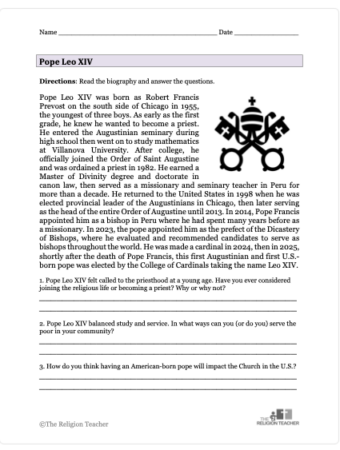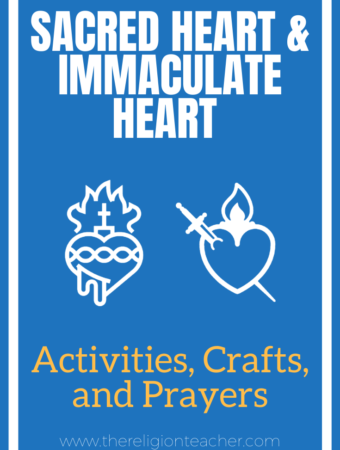The ten commandments are such an important topic in Catholic religious education curricula. They have a place in almost every year’s course. This Ten Commandments activity asks students to creatively interpret and understand these great laws.
An important disclaimer: the risk of using this activity is that students lose an appreciation for the Scriptures as the Word of God. Before introducing the activity, be sure to point out that the wording of the commandments come from God’s infinite wisdom. Scripture is not something we can water down with our own words and interpretations or judge for being written in a certain way.
A Ten Commandments Group Activity
Have students work in pairs to rewrite the Ten Commandments in positive language. They should replace the “You shall not…” with a positive statement (“You shall…”). For commandments three and four, students can transform the phrasing into negative statements (“You shall not…”).
The Ten Commandments
(the traditional Catechetical formula from the Catechism): 
1. I am the LORD your God: you shall not have strange gods before me.
2. You shall not take the name of the LORD your God in vain.
3. Remember to keep holy the LORD’s Day.
4. Honor your father and mother.
5. You shall not kill.
6. You shall not commit adultery.
7. You shall not steal.
8. You shall not bear false witness against your neighbor.
9. You shall not covet your neighbor’s wife.
10. You shall not covet your neighbor’s goods.
Ten Commandments Worksheet
Shannon Cardaronella (wife of Marc Cardaronella) sent me a great worksheet that she uses for this Ten Commandments activity. With her permission, I’m sharing it here for you to use as well:
Download the Rewrite the Ten Commandments Worksheet
Thanks Shannon!
Teaching Ten Commandments Vocabulary to Kids
If you are introducing the Ten Commandments to kids for the first time there are almost always some students who will not know the meaning of words like adultery and covet. Rather than asking students to sheepishly come up with explanations for adultery, just provide them with a definition and extend it beyond just married people.
adultery — voluntary sexual intercourse between a married person andsomeone other than his or her lawful spouse.
covet — to desire wrongfully without due regard for the rights of others
To help students memorize and remember the Ten Commandments try using this word search and crossword puzzle.
Discussing the Rewritten Commandments
Most of the time the students will plug in words like “respect” and “honor” into the commandments. Sometimes they might even use the word “love.”
Be sure to point out the importance that we place on “love” over “respect” as Christians. We don’t just respect God by saying good things about him or going to Church on Sundays. We love God.
Point students to Matthew 22:36-39. Note that these two greatest commandments summarize and extend the Ten Commandments. Jesus didn’t ask us to respect and honor our neighbor, he asked us to love our neighbor!
Love, in this case, is not a romantic love but a self-giving love that always seeks what is best for the other person. The Ten Commandments are crucial to the Christian life because they teach us how to love. Christ inspires us by his life to know how to love as well.
More Ten Commandments Resources
Want to encourage your students to go even further in learning the Ten Commandments? Try using the meditations and exercises in The Religion Teacher’s Ten Commandments Worksheets.
The Religion Teacher’s Ten Commandments Worksheets are designed to encourage students not only to know the commandments, but to live them. Through exercises inspired by the process of lectio divina, students will come to recognize how to live each commandment in various ways.




Dear Jared: I am the CRE for a small Catholic parish in the Worcester Diocese. My pastor and I are very impressed with the new YouCat (The CCC for Youth) . We have about 30-35 students in all with grades 7-10. We meet for 2 hours at a time with 15 minutes of this time for common prayer and a 15 minute break. leaving us 90 minutes for instructions. We do break up into class groups. Father and I want to have the students use the YouCat in each of their classes. I plan to write worksheets over the Summer for the Catechists. Do you have strategies for making up my own worksheets?
Hi Judy,
Great idea. I think the YouCat looks like a great resources (though in all honesty I haven’t spent any time using it). When I create worksheets I focus first on a learning objective and create activities in the worksheet (or graphic organizer) that helps students reach the objectives. Most of the time these worksheets are creative ways of helping students organize the information they read in the book.
The kids do the best with straight-forward question and answer. Add some design elements and some opportunities for creative thinking and you have yourself a quality educational resource.
I am teaching 4th grade PRE for the first time. In teaching the 6th Commandments to 10 year olds I am a little hesitant to give them such a straightforward definition of adultery. I am more concerned as to the parents reaction of this. What would you suggest a good way to explain this to them? I was thinking of just saying that having any relationship with someone outside one’s own marriage is adultery. If the questions arise about a non married relationship I would say that any relationship that is intended to be saved for marriage, but is not, can be considered adultery. What do you think? I think the age is still tender enough that I do not want to cross any lines that have not yet been discussed with these children either by their parents or teachers.
Camille, I think you are right on track here. I can’t think of another way to explain it. In a strict sense adultery is referring to a sin of married people, but if you read about the commandment in the Catechism (CCC, 2380-2400), you will find it talks about marital infidelity, divorce, polygamy, incest, and “free unions.” As catechists we need to protect the dignity of marriage.
The best thing to do would be to contact the parents ahead of time. Ask for their input. See if there are some issues that really strike a cord with them.
Camille, I teach 4th grade too and plan to go over 10 commandments this wednesday. I will just say that those in a marriage can not act married or in love with someone else and if they do that is adultery. I would never say sex, sexual, or anything like like. I still havent gone into depth when teaching it to my 6th grader at home even!
Thank Jared, i always come here when i need some help and direction. I appriciate all you do!
Angela
I teach 3rd grade. My Adultery commandment explanation is – if you are married you can only like/love your wife/husband. You can’t like another man/lady in a girlfriend/boyfriend way. They seem to understand that context. Yes, stay away from all the sexual details at this age. But, it is important for them to understand from an overview what the commandment means.
This past fall a group of adults and our high school religious education class studied the YOUCAT. We are a very small parish also. We used the YOUCAT book, the Exploring Youcat DVD, the high school text book “The Catholic Faith Handbook”, and created our own activites and worksheets to go along. We are still on this journey as we have about 3 months left for our religious education year. We would be glad to share our resources too.
I have been a catechist for more than ten years already and it has been my joy to create an activity that will help children understand our faith. Since, I have to be updated on the right strategies and approaches that I have to use, I need to read a lot and research for what is new. Please help me look for good reading materials and researches that I can use. Thank you and God bless.
Just wanted to thank everyone for their input on the Ten commandments and adultery. This is my 2nd year teaching 4th & 5th grade students. I only have 1 hour a week to teach and have not felt comfortable explaining adultery. You al have helped me greatly. Thank You
Camille, For the under second grade littles I say “Love your marriage”. They will understand Love and its complexities and “rules” as they grow. I layer the meanings of the Commandments each year with deeper meanings. We sing a “young kids version” –( I wish I could put sound to this :)) –several kids have told me they sing the song in their heads during confession when they “lock” and can’t recall their sins, they can at least go down the “list” in the song.
God
O my God
Church on Sunday
Mom and Daddy
Do not murder
Love my marriage
Number seven, do not steal
Do not lie
Don’t be jealous
Of the others,
or their stuff,
But Always love.
Always love.
God is love!